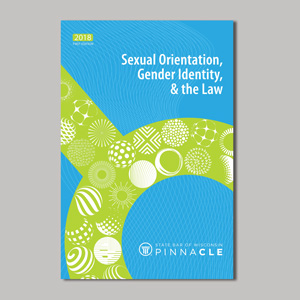
When my child, born female, entered the ninth grade in 2015, he began to experience profound feelings of gender dysphoria. This condition arises when there is a significant incongruence between an individual’s gender identity and their assigned sex at birth, resulting in substantial discomfort or distress.
In less than a year, he was certain he was meant to be male. Many people have asked me if I saw this coming, and the truth is, I did not. My child had many qualities that I associated with femininity: soft-spoken, kindhearted, and devoted to caring for his younger brother. I used to joke that my younger son had two moms.
My initial reaction to my son's revelation was filled with concern. I feared for his safety and happiness, worrying that he was headed down a difficult path fraught with serious medical procedures, possible drug addiction, discrimination, and even targeted violence.
At the time, I had little knowledge of transgender issues and popular media often portrayed grim narratives.
I had a lot to learn.
My Son’s Transition
The potential consequences of my child’s decisions weighed heavily. I understood that taking testosterone would deepen his voice permanently and could render him unable to conceive children in the future.
 Heidi Mangelsen, St. Thomas 2010, is a Reentry Legal Services (RLS) attorney with
Legal Action of Wisconsin, in Oshkosh. Her practice focuses on providing legal services to incarcerated people as they approach their release from prison.
Heidi Mangelsen, St. Thomas 2010, is a Reentry Legal Services (RLS) attorney with
Legal Action of Wisconsin, in Oshkosh. Her practice focuses on providing legal services to incarcerated people as they approach their release from prison.
Like many people with gender dysphoria, my child began to struggle with depression and anxiety. So much so, that I suggested to him that we see his doctor and possibly start him on an antidepressant. He said, “Mom, I don’t need antidepressants. What I need is testosterone.”
Ultimately, I realized that I had to trust my son. He had never been attention-seeking, and throughout his life, he had shown remarkable emotional maturity.
My final shift toward acceptance came after meeting with a transgender man at the recommendation of a friend. This man, several years into his transition, was thriving – healthy, happy, and productive. It was then that I began to see that my child could have the same bright future.
Public Restrooms for Transgender Students
One of the most immediate concerns for many transgender people, including my son, involves access to public restrooms.
Thankfully, in 2017, the Seventh Circuit Court of Appeals issued a landmark ruling in
Whitaker v. Kenosha Unified School District, 858 F.3d 1039 (7th Cir. 2017), holding that the Kenosha Unified School District violated Title IX and the Equal Protection Clause of the 14th Amendment by denying a transgender boy access to the boys’ restroom.
This decision established that transgender students have the right to use bathrooms that align with their gender identity, setting a significant precedent for the protection of transgender rights in schools. As a result, my transgender son did not face issues regarding bathroom access in his Wisconsin public school in 2018, thanks to the protections given by this ruling just one year earlier.
Gender-affirming Care
Gender-affirming care involves providing medical and psychological support to help individuals align their physical characteristics and lifestyle with their gender identity. It includes things like prescriptions for hormones, surgical procedures, and talk therapy.
Just two years after
Whitaker, in
Flack v. Wisconsin Department of Health Services (2018), the court ruled that excluding gender-affirming treatments from Medicaid coverage was unlawful (Flack v. Wisconsin Department of Health Services, No. 3:18-cv-309, W.D. Wis.) This decision further expanded transgender rights in Wisconsin. The court’s recognition of the necessity of these treatments for gender dysphoria represented a broader understanding of the medical needs of transgender individuals.
As a lawyer, this decision reinforced to me the critical role of the judiciary in shaping civil rights protections for transgender individuals. As a mother, it offered hope.
As a lawyer and a mom, I’ve learned that love, acceptance, and the law are closely connected.
Changing Birth Certificates
Wisconsin law allows for a transgender individual to have their legally changed name reflected on their birth certificate.
However, the newly created birth certificate also lists the former name at the bottom in a section entitled, “Amendment by the State Registrar.” The old name is given as well as the date of the amendment and the amendment authority, usually a court order. So, my child’s “updated” birth certificate shows both his new male name as well has his original female name.
Additionally, the gender marker on his birth certificate remains unchanged. It lists his sex as “female.” According to Wis. Stat. section 69.15(4)(b), individuals have the right to request a change in the gender marker on their birth certificate to align with their gender identity (Wisconsin Legislature 2024). However, this statute requires that the individual first undergo a surgical sex-change procedure in order to be eligible.
This legal requirement places a significant burden on transgender individuals who may not wish to or cannot undergo surgical procedures. It presents a barrier to having their gender identity legally recognized, as the statute demands irreversible medical intervention as a prerequisite for updating basic legal documents.
The reality for a transgender individual in Wisconsin is that the details listed on their birth certificate unequivocally disclose their transgender status, with no option for redress under current law. Even those who undergo sex-change surgery will find that the amendment section of their birth certificate still lists their previous name. As a result, only those who were given gender-neutral names at birth and have also undergone surgery are likely to possess birth certificates that do not reveal their transgender status.
The inclusion of an incorrect gender marker on a birth certificate can have implications in various personal and professional contexts. Individuals may unwillingly disclose their transgender status when presenting the document in situations such as starting a new job, enrolling in school, or adopting a child. This disclosure may result in discrimination, harassment, or other adverse consequences.
A system based on self-identification for updating gender markers would provide transgender individuals with greater protections, greater accuracy in legal documents, and increased personal safety. Additionally, a legal process that allows transgender individuals to petition for the removal of the name change amendment from their birth certificates could address concerns about unwanted disclosure of original birth names.
Transgender individuals should have the right to birth certificates that accurately reflect their gender identity, and the process to obtain these documents should be streamlined and accessible.
Lack of Protection from Discrimination
In Wisconsin, there are still significant gaps in legal protections for transgender individuals, particularly in the areas of employment (Wisconsin Fair Employment Act, Subchapter II of Chapter 111; Wisconsin Legislature, 2024) and housing (Wisconsin Legislature, 2024). Wisconsin was the first state to ban discrimination based on sexual orientation in 1982 (Wisconsin Legislature, 1982), but the law has not been updated to protect against discrimination based on gender identity or expression.
There has been some action at the executive and local levels. In 2019, Gov. Tony Evers signed an executive order protecting state employees and contractors from discrimination based on gender identity or expression (Executive Order No. 1, 2019). And some local municipalities, such as Milwaukee have enacted such protections (Milwaukee Code of Ordinances chapter 109-1(2)).
But too many transgender people across the state remain vulnerable to harassment and discrimination.
Legislative Challenges in Wisconsin
In 2023, the Wisconsin State Assembly approved a few key bills that would have made the lives of transgender individuals harder. Assembly Bill 465 would have banned gender-affirming medical treatments for minors. Assembly Bill 377 aimed to prevent transgender women and girls from participating in women’s sports at both high school and college levels. Both bills were vetoed by the governor.
Meanwhile, Wisconsin courts have not taken up the issue of discrimination against transgender people based on their identity.
Final Reflection
It has been eight years since my son first shared his journey of self-discovery with me.
Today, it’s difficult to recall our reality before his transition. While the adjustment took time, I have always embraced him for who he is. He remains soft-spoken, kindhearted, and deeply devoted to his younger brother. A 2022 college graduate, he is thriving both professionally and personally, living happily with his partner and their two cats.
As a lawyer and a mom, I’ve learned that love, acceptance, and the law are closely connected. My son’s journey has illuminated not only the complexities of gender identity issues but also the influence that the legislature and courts have to directly impact our family’s life. Everyone deserves to live authentically, with dignity, and without fear of discrimination.
This article was originally published on the State Bar of Wisconsin’s
Public Interest Law Section Blog. Visit the State Bar
sections or the
Public Interest Law Section web pages to learn more about the benefits of section membership.

Lesbian, gay, bisexual, transgender, and queer (LGBTQ) individuals face specific challenges in school, employment, health care, and many other settings. As a lawyer, it’s vital you understand these obstacles and how to approach them. This book can help you.
Whether you’re advising an individual, school, business, or agency, you’ll be equipped to help your clients:
Understand their rights and responsibilities
Protect school access and rights for all students
Proactively develop compliant sexual orientation and gender identity policies
Respond to legal conflicts involving sexual orientation and gender identity
Find out more about the updates for the
Sexual Orientation, Gender Identity, and the Law on WisBar's Marketplace.
